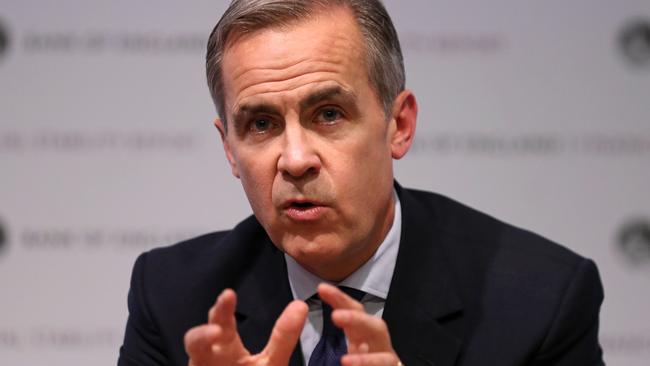Bank of England’s chilling Brexit warning: Risk of ‘deep recession’
The Bank of England has warned a “no deal” Brexit could plunge the UK into “deep recession”.

The Bank of England has issued a chilling warning about disastrous impacts on the British economy if the United Kingdom crashes out of Brexit with a no deal and no transition period.
In the case of a very disruptive Brexit the Bank of England Governor Mark Carney says the United Kingdom could face a sharp immediate contraction of eight per cent of GDP promoting a ‘’deep recession’’, rising unemployment to seven per cent, escalating inflation to 6.5 per cent and plummeting house prices by a third.
Mr Carney said the figures were not forecasts, but rather ‘’scenarios’’ but they roughly fall in line with the government’s own Treasury figures, which also paint an alarming post-Brexit economy.
Treasury said that the UK would be poorer under any Brexit deal, predicting that if there was a hypothetical free trade agreement with the EU, that the UK GDP would be 6.7 per cent less. If there was a no deal, the Treasury says GDP would plummet 9.3 per cent and the pharmaceutical and automotive industries would suffer a contraction of 20 per cent.
Treasury said over the next few years the economy will be 9.3 per cent below where the country would have been if there had been no Brexit.
But the analyses have been ridiculed by Brexiteers as part of British prime minister Theresa May’s Project Fear, as she seeks to bulldoze her negotiated deal with the EU through a Westminster vote on December 11.
Brexiteer Jacob Rees Mogg said the Bank of England was whipping up hysteria. He also criticised the Treasury report, saying it was worthless because it didn’t factor any non-EU trade after Brexit which is expected to contribute 90 per cent of global growth.
Mr Carney said he produced the scenarios upon request from the government, but that his job was also to plan for the worst case, not hope for the best. But his warnings come with a well known caveat: he also predicted severe economic shock if the country voted for Brexit back in 2016 and none of his forecasts eventuated.
He said ‘’ the country is not yet fully prepared for a cliff edge Brexit’’.
But Mr Carney insisted that stress tests on the British banking system showed that the banks had more than enough capital for a disorderly exit and more than enough liquidity.
A British economist and former Monetary Policy Committee of the Bank of England Andrew Sentance told Sky News:
“The Bank of England didn’t spot the severity of the global financial crisis and they now err to find the most extreme scenario they can dream up. Yes there are big risks of a no deal Brexit but to over-egg the pudding and throw in the kitchen sink is in danger of affecting the credibility of the bank.”
The pound has remained largely unchanged after a brief rally when Labour deputy leader John McDonnell suggested that Labour could support a People’s Vote — or second referendum — if Mrs May failed to get her Brexit deal though Westminster and there was no option for a general election.



